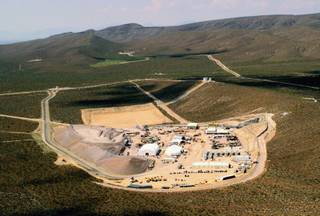Sunday, May 6, 2012 | 2 a.m.
Sun coverage
When Congress gets back to town this week, two items will be up for discussion that, as we reported last week, will heavily interest Nevada: cybersecurity and Yucca Mountain.
But one thing you probably won’t hear much about is a plan to combine the two. Not because there isn’t one being whispered about. It’s just that it hasn’t yet taken root in Congress.
Washington lawmakers have been talking about Yucca for years, but remarkably, the conversation hasn’t evolved past “build the nuclear waste dump” versus “no, don’t.”
There’s good reason for that. Yucca is, after all, perennially in congressional crosshairs.
But on the sidelines, out of the limelight, there’s a serious conversation percolating about alternative uses for Yucca. One of the more interesting ideas may get fresh attention thanks to quirks of the congressional calendar that brought them into close proximity.
“There’s a small movement of people in the intelligence world who would like to turn Yucca into a giant data center,” Al Melquist told me.
Melquist is a software engineer and former hacker from Las Vegas who, like many others, has worked for various federal agencies over the years.
“One of the biggest issues that we face as a country is an (electromagnetic) blast,” he said. “If you want to take out the United States ... you just have a nuclear blast above ground and the EMFs wipe out everything ... wipe out data, wipe out the ability for anybody to trace their bank accounts, and you’re done.”
Yucca Mountain has something to counteract that: mesh specifically intended to catch the nuclear ions that might escape a canister of spent fuel. It’s meant to keep the public safe.
But in a different scenario, it could also keep those same ions out — and whatever is inside Yucca Mountain safe.
“If you took that facility and, instead of putting containers full of nuclear waste, you turned them into data storage containers ... you could store everything in there,” Melquist continued. “It’s underground. It’s protected. It’s sealed.”
Why believe a hacker who said he’s wise to the ways of the intelligence community?
Perhaps because the Nevada congressman who’s most connected to the intelligence world agrees with him.
“I started that rumor,” Rep. Joe Heck said when asked whether there were serious conversations going on in the intelligence community about turning Yucca into an important national cybersecurity facility. Heck sits on the House intelligence committee.
“There’s restricted airspace (around Yucca); it’s impenetrable underground,” Heck said. “If we could get the infrastructure out there ... I believe that there is potential for that to be one of the federal government data centers.”
There are always limiting environmental factors when you’re talking about building anything in the desert: For nuclear, it’s been the lack of water; for a data center, it’s the lack of electricity. (Even though Yucca does border the Amargosa Valley, which is set to become Nevada’s hottest corridor for solar energy production in the next few years.)
Still, with that sort of endorsement, it’s somewhat remarkable that the idea hasn’t gotten more play.
Last fall, Nevada Sen. Harry Reid commissioned the General Accounting Office to study alternative uses for Yucca Mountain. It surveyed panels of experts and came up with 30 proposals, ranging from nuclear reprocessing to paper document storage to defense testing. But a cybersecure data facility didn’t make the list.
Reid though, doesn’t seem to be ruling any alternate uses out, so long as they don’t involve radioactive spent fuel.
“Reid is actively encouraging new uses for Yucca and generally expanding the mission of the Nevada National Security Site,” Reid spokeswoman Kristen Orthman said Friday.


Join the Discussion:
Check this out for a full explanation of our conversion to the LiveFyre commenting system and instructions on how to sign up for an account.
Full comments policy